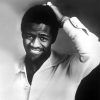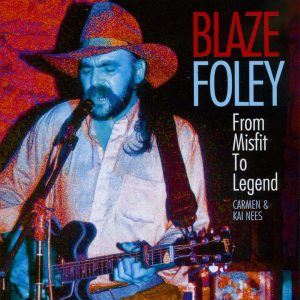calsfoundation@cals.org
Blaze Foley (1949–1989)
aka: Michael David Fuller
Singer-songwriter Michael David Fuller worked under the names Depty (or Deputy) Dawg and then Blaze Foley, being best known by the latter. His songs have been recorded by singers such as Merle Haggard, Willie Nelson, Lyle Lovett, and John Prine.
Blaze Foley was born on December 18, 1949, to Edwin Fuller and Louise Fuller in Malvern (Hot Spring County). His family traveled as gospel performers and were known as the Singing Fuller Family. Foley began singing with the group at the age of eleven with his mother, brother, and sisters. When Foley was a baby, the family left Arkansas for Texas, settling in San Antonio and later the Dallas/Fort Worth area. While an infant, he contracted polio, which was cured but left one leg longer than the other. As a young man, he lived in several different states, including Georgia, Tennessee, and Illinois. Known initially by the name Deputy (“Depty”) Dog, by the mid-1970s he had changed his public name to Blaze Foley, a tribute to country singer Red Foley and stripper Blaze Starr.
Most associated with Austin, Texas, Foley developed a following there and befriended numerous fellow musicians, including singer-songwriter Townes Van Zandt. Although Foley made several studio recordings with full instrumentation in the 1970s and 1980s, they failed to be released during his lifetime, and he did not find a national audience until after his death. Foley eked out a living as a solo artist, delivering his songs, some characteristically witty and others more poignant, with a distinctive baritone voice accompanied with his own fingerpicked acoustic guitar. His music is perhaps best represented by Live at the Austin Outhouse, which circulated originally on cassette but was remastered and released on CD in 1999.
Foley stood 6’3″, walked with a limp (due to the effects of polio), had a large mustache, and often wore a fedora. Though he appeared as an imposing figure and was given to fits of rage when under the influence of drugs or alcohol, he was known for his gentle but highly idiosyncratic personality. Foley’s attraction to duct tape, with which he fashioned or ornamented a variety of items—clothes, boots, wallets—earned him yet another appellation: “Duct Tape Messiah.” Noted for his highly individualistic, transient lifestyle, Foley slept on friends’ couches and in automobiles, as well as some even more unusual places—in a treehouse (shared with girlfriend Sybil Rosen), under a pool table at the club the Austin Outhouse, under bridges, and allegedly in dumpsters. It was only shortly before his death that, through songwriting royalties, he was able to reside in a rented room in Austin.
Foley died in Austin on February 1, 1989, after being shot by Carey January, the son of an elderly African American man, Concho January, whom Foley had befriended. The son reportedly had beaten his father and taken his Social Security and veterans’ checks to buy illegal drugs, though he claimed that it was Foley who took advantage of his father. Carey January was acquitted of murder by pleading self-defense, despite Concho January’s statement that Foley had attempted to defend him.
Interest in Foley’s music and his eccentric lifestyle has grown sharply since his death. His best-known song is “If I Could Only Fly,” which was recorded (shortly before Foley’s death) by Merle Haggard and Willie Nelson, again as a solo by Haggard, and more recently by fellow Arkansan Joe Nichols. Foley’s “Clay Pigeons” was covered by John Prine (whom Foley admired deeply) and the Avett Brothers, and Lyle Lovett recorded his “Election Day.” Foley is the inspiration for Lucinda Williams’s “Drunken Angel” and Townes Van Zandt’s “Blaze’s Blues.”
Foley has been the subject of several works in the twenty-first century. He is the focus of a 2017 episode of the Cinemax animated documentary series Mike Judge Presents: Tales from the Tour Bus; Kevin Triplett directed a documentary film on him, Blaze Foley: Duct Tape Messiah (2011); Sybil Rosen’s book Living in the Woods in a Tree: Remembering Blaze Foley was published in 2008; Foley’s friend and musical collaborator Gurf Morlix recorded an album of his songs, Blaze Foley’s 113th Wet Dream (2011); and many other tribute albums and collections of Foley’s own performances have appeared in the years since his death. A movie based on Rosen’s book, called Blaze and directed by Ethan Hawke, premiered at the Sundance Film Festival in 2018; it stars Arkansas musician Ben Dickey as Foley.
For additional information:
Blaze Foley: Duct Tape Messiah. Directed by Kevin Triplett. Abraxas Productions, 2011.
Koch, Stephen. “Never a Star, Always a Legend.” Arkansas Times, September 27, 2018, pp. 12–16. Online at https://www.arktimes.com/arkansas/blaze-foley-never-a-star-always-a-legend/Content?oid=23552625 (accessed March 1, 2024).
Kruth, John. To Live’s to Fly: The Ballad of the Late, Great Townes Van Zandt. New York: Da Capo, 2007.
Nees, Carmen, and Kai Nees. Blaze Foley: From Misfit to Legend. N.p.: 2018.
Rosen, Sybil. Living in the Woods in a Tree: Remembering Blaze Foley. Denton: University of North Texas Press, 2008.
Bryan L. Moore
Arkansas State University


 Blaze Foley Book
Blaze Foley Book 



As a lyricist he was extremely underrated. His spirit resonates abundantly throughout his songs, and it’s no wonder why Lucinda & TVZ wrote songs about him. It becomes obvious why TVZ had to have his guitar.